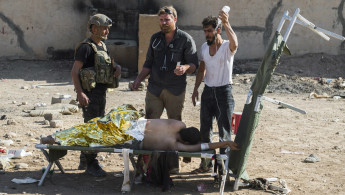Mounting civilian casualties in Mosul 'overwhelming' aid groups
Almost 200 wounded civilians and Iraqi army fighters were taken to hospital last week, marking the highest number of admissions since the offensive began last month, the UN's Lisa Grande told Reuters.
"Authorities are doing everything they can to help but there isn't sufficient trauma capacity at the field level to deal with the numbers of people being wounded by sharp-shooters and snipers and in crossfire. Civilians are being targeted by [IS]," Grande said.
The number of civilian causalities is likely to increase as residents are deliberately targeted by IS fire, Grande warned.
"We are very worried that more and more civilians will be hurt and victimised as the campaign intensifies," she said.
"Civilians are not being caught in cross-fire, they are being targeted."
Civilians made up around 20 percent of the causalities fallen from the fighting in the first month, a department of health official told Reuters.
While authorities in Iraq do not officially release casualty statistics, UN figures may represent only a small fraction of the total number of victims as they are based on only severe cases that were not treated on site.
Over 20,000 people already fled to government-held areas since the offensive on Mosul was launched on 17 October, but 1.2 million civilians - including 600,000 children - remain trapped behind IS lines.
The UN warned that thousands are being held by IS militants for possible use as human shields.
IS militants are roaming around the city via tunnels and driving suicide car bombs into advancing troops as well as targeting them with sniper fire.
The Iraqi military began the campaign one month ago to retake Mosul, Iraq's second largest city and the last major urban centre in the country still held by the militants.
Most gains so far have been made by the special forces operating in the section of Mosul east of the Tigris river.





 Follow the Middle East's top stories in English at The New Arab on Google News
Follow the Middle East's top stories in English at The New Arab on Google News


